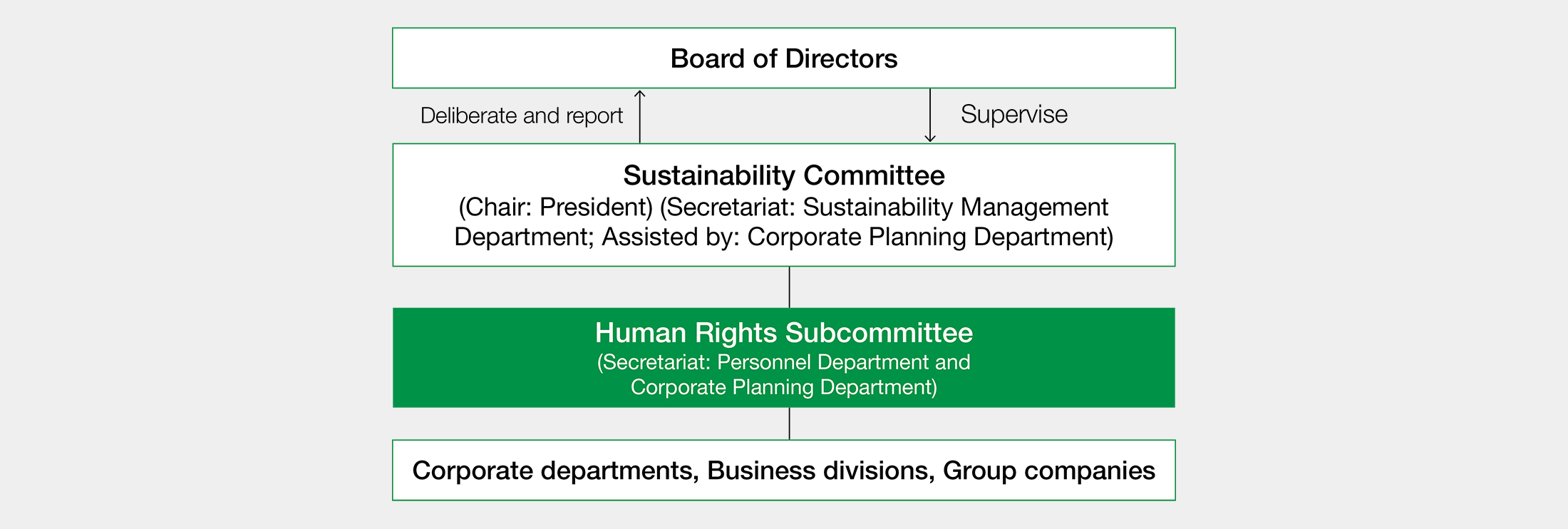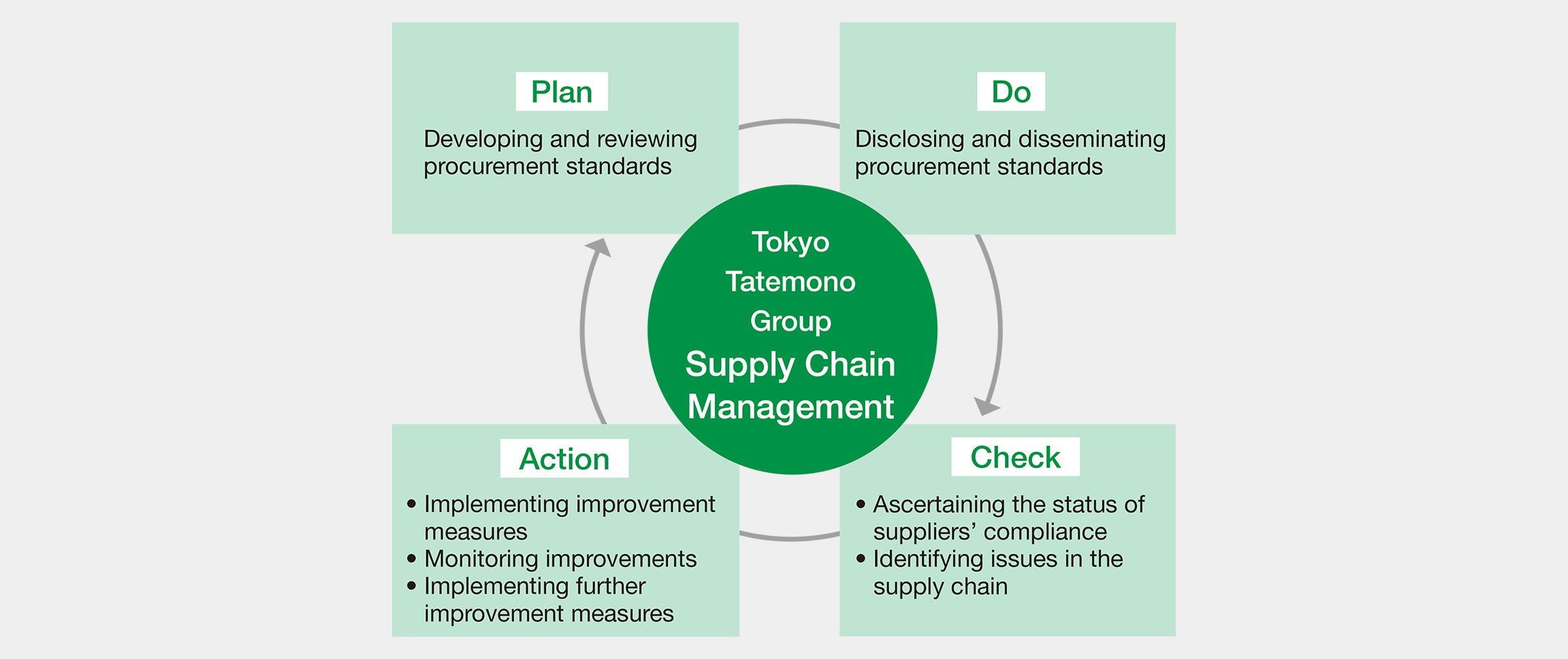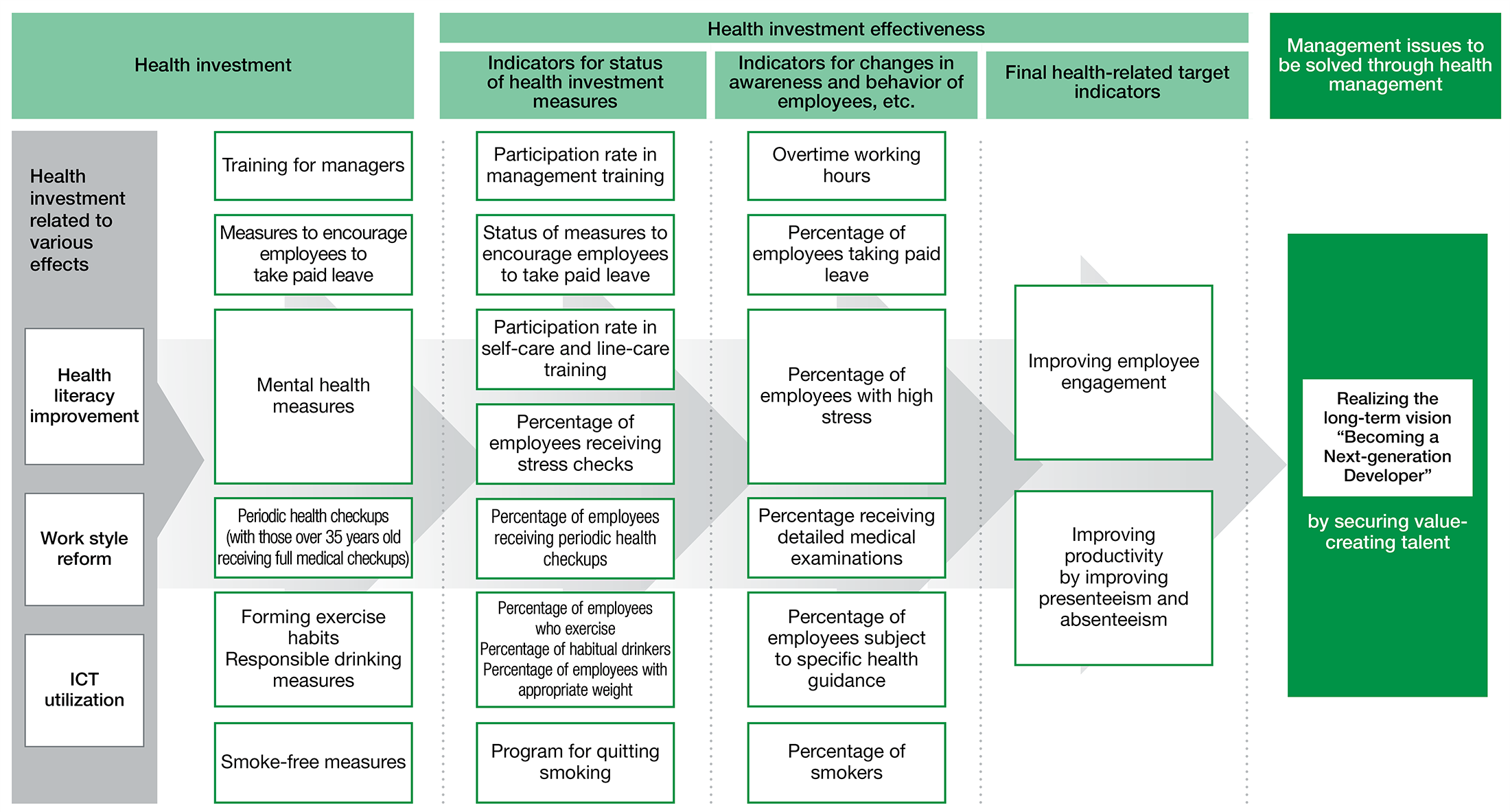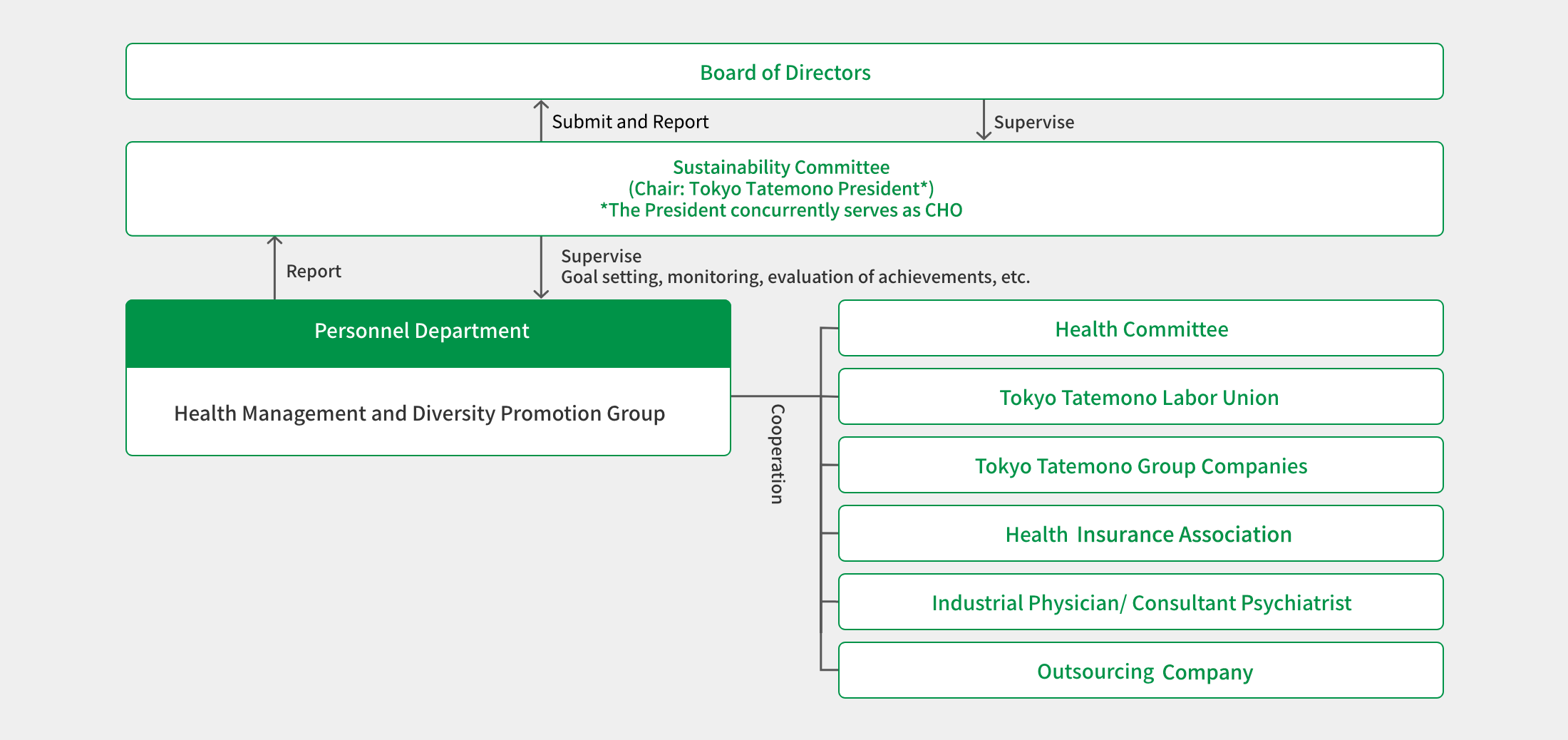
Social
KPIs and Targets
Respect for Human Rights

Related Material Issues
-
Contributing to a safe and secure society
-
Diversity & Inclusion
-
Advancement of governance
-
Strengthen risk management framework
Policy and Concept
Based on the United Nations Guiding Principles on Business and Human Rights, the Tokyo Tatemono Group has established the Tokyo Tatemono Group Human Rights Policy, which specifies the matters all employees, including officers and contract employees, as well as temporary employees, and all other persons engaged in business, should adhere to. Based on this policy, the Tokyo Tatemono Group is promoting initiatives to respect the human rights of all stakeholders involved in our business, such as the prohibition of forced labor and child labor, and the prohibition of discrimination and harassment based on race, nationality, beliefs (including religion), gender, sexual orientation, age, social status, or origin.
Through human rights due diligence based on this policy, the Tokyo Tatemono Group is working to identify issues related to human rights in the Tokyo Tatemono Group's business, mitigate or correct any issues that exist, and provide relief to those who have been adversely affected by any human rights issues.
Furthermore, by publishing this policy on our website, we clearly communicate our expectations for all stakeholders regarding the advancement of human rights.
We also request that suppliers collaborating with the Group in its business activities, including secondary and subsequent suppliers, promote respect for human rights through initiatives based on the Sustainable Procurement Standards.
System
The Tokyo Tatemono Group, led by the Sustainability Committee, chaired by the President, and the Human Rights Subcommittee, which is a subordinate organization of the Sustainability Committee, promotes human rights initiatives together with relevant departments and Group companies, and with support from external experts.
The Sustainability Committee not only deliberates and discusses on the formulation of Human Rights Policies, etc., the development of systems, the setting of human rights-related metrics and targets, and specific initiatives, but also monitors and evaluates the status of initiatives and the progress of achieving targets. The Human Rights Subcommittee is administered by the Personnel Department and the Corporate Planning Department. It brings relevant departments and Group companies together as necessary to discuss the promotion of initiatives based on the Human Rights Policy and human rights due diligence, and shares updates on the progress of these efforts. In FY2024, the Subcommittee discussed matters related to respecting human rights within the Group's business supply chain, as well as human rights assessments for participation in new overseas projects. Important matters deliberated and discussed by the Committee are submitted to or reported to the Board of Directors. The Board supervises the Group's human rights initiatives.
International Norms the Tokyo Tatemono Group Supports and Respects
-
The International Bill of Human Rights, consisting of the Universal Declaration of Human Rights, the International Covenant on Civil and Political Rights, and the International Covenant on Economic, Social and Cultural Rights
-
Guiding Principles on Business and Human Rights
-
International labor standards on human rights, such as the International Labour Organization's (ILO) Declaration on Fundamental Principles and Rights at Work, which stipulates fundamental rights in the workplace (freedom of association and the right to collective bargaining, the elimination of forced labor, the effective abolition of child labor, and the elimination of discrimination in respect of employment and occupation)
Compacts Tokyo Tatemono Has Signed and Endorsed in which the Group Participates
-
United Nations Global Compact
Framework Chart (Human Rights)

Human Rights Due Diligence Initiatives
The Tokyo Tatemono Group is engaged in human rights due diligence in accordance with the Tokyo Tatemono Group Human Rights Policy. Human Rights Due Diligence involves identifying human rights issues, prioritizing those requiring action, anticipating potential negative impacts on human rights, implementing preventive or mitigating measures, monitoring their effectiveness, and making improvements as necessary.
Human Rights Due Diligence Process

Organizing Human Rights Issues
Based on the United Nations Environment Programme Finance Initiative (UNEP FI) Human Rights Guidance Tool and other guidance on human rights, the Tokyo Tatemono Group has organized the stakeholders involved in the Tokyo Tatemono Group's business and identified general human rights issues that may arise as a result of corporate activities, as well as human rights issues specific to the real estate industry.
Identification and Assessment of Human Rights Risks (Identifying Priority Human Rights Issues)
Based on the organized human rights issues, we identified and disclosed the human rights issues that are a priority for the Tokyo Tatemono Group after identifying the human rights risks specific to the Tokyo Tatemono Group. We then assessed the level of priority from the perspective of the scale of the impact on human rights, including the severity and likelihood of occurrence, and the connection with the Tokyo Tatemono Group. During this process, we received advice from human rights experts and had discussions at workshops attended by all group companies as well as consultations at Sustainability Committee meetings.
For the identified priority issues, we continually strive to understand conditions across business areas, countries, and regions. When potential negative impacts on human rights are anticipated, we implement preventive or mitigating measures. The effectiveness of these measures is monitored, and if problems are found, we make efforts to improve them and disclose the status of these efforts.
Tokyo Tatemono Group's Priority Human Rights Issues
-
Forced labor, child labor
-
Impact on local communities
-
Health and safety
-
Discrimination and harassment
-
Employee working conditions and working environment
-
Supplier working conditions and working environment
-
Right to privacy
Actions
Supply Chain Management

Related Material Issues
-
Contributing to a safe and secure society
-
Promoting a decarbonized society
-
Promoting a recycling-oriented society
-
Diversity & Inclusion
-
Advancement of governance
-
Strengthen risk management framework
Policy and Concept
The Tokyo Tatemono Group conducts its business in collaboration with a wide range of suppliers (business partners involved in procurement in our business activities), including construction companies and building management firms. Today, companies are expected not only to implement sustainable procurement practices within their own operations, but also to ensure respect for human rights and consideration for the environment throughout their entire supply chain. Therefore, it is essential to build a sustainable supply chain that takes into account the environmental and social impacts associated with suppliers.
In May 2021, the Tokyo Tatemono Group established a unified set of Sustainable Procurement Standards applicable to all suppliers involved in its business operations in order to promote sustainable procurement across the entire supply chain, with consideration for legal compliance, respect for human rights, occupational safety and health, anti-corruption, and environmental conservation.
The Tokyo Tatemono Group is working to build a sustainable supply chain by encouraging understanding and compliance with the procurement standards through dialogue with suppliers and business partners.
Summary of the Tokyo Tatemono Group Sustainable Procurement Standards
1. Observance of Laws and Regulations
-
Compliance with the laws and regulations of the countries and regions in which we operate
2. Respect for Human Rights
-
Ensuring compliance with and respect for international standards relating to human rights and respect for basic human rights based on international standards
-
Prohibition of discrimination and harassment
3.Assurance of Sound Labor Practices and Working Environments
-
Ensuring freedom of association and the right to collective bargaining
-
Eliminating and preventing forced labor and child labor
-
Prohibiting discrimination in labor conditions on the basis of race, nationality, creed, gender, sexual orientation, age, social status, origin, etc.
-
Complying with laws and regulations governing minimum wages, overtime pay, benefits, etc.
-
Prohibiting illegal overtime and excessive labor
-
Creating a safe and healthy working environment
4. Fair Business Activities
-
Prohibition of bribery and other corrupt practices
-
Prohibition of unfair and anti-competitive transactions
-
Blocking relationships with antisocial forces
-
Prohibiting infringement on the intellectual property rights or trade secrets of third parties
-
Protection and appropriate management of personal information and confidential matters
-
Protection of confidentiality of information related to reporting and the anonymity of whistleblowers and eliminating retaliation against whistleblowers
5. Assurance and Improvement of Safety and Quality
-
Ensuring and improving the quality of products and services and disclosing accurate related information
-
Responding sincerely to requests and complaints
6. Environmental Considerations
-
Promotion of energy conservation, reduction of greenhouse gas emissions
-
Promotion of the 3Rs, efficient use of resources, reduction of waste generation, reuse, and recycling
-
Prevention of pollution of air, water, soil, etc., and appropriate management and processing of chemical substances
-
Preservation of biodiversity and reduction of impact on ecosystems
-
Elimination of illegal raw material procurement
7. Co-existing with Local Communities
-
Building, maintaining, and strengthening good relationships with local communities
-
Understanding and respecting the culture and customs of local communities
8. Formulation and Construction of a BCP Framework
-
Formulate a business continuity plan (BCP) and build a system to implement it
9. Collaboration in the Supply Chain
-
Encourage business partners to understand, comply with, and improve the procurement standards.
System
The Tokyo Tatemono Group is promoting initiatives related to supply chain management under the leadership of the Sustainability Committee, chaired by the President. The Sustainability Committee deliberates and discusses important policies related to supply chain management, including the development and review of the Sustainable Procurement Standards and the identification of key suppliers, and monitors and evaluates the status of initiatives based on these policies. Important matters deliberated and discussed by the Committee are submitted to or reported to the Board of Directors, allowing them to supervise overall supply chain management.
Supply chain management initiatives are promoted in collaboration with relevant departments and Group companies, while also utilizing support from external experts and exchanging information with industry peers, and through dialogue with key suppliers involved in our business.
Supply Chain Management PDCA

Actions
Improving Quality and Customer Satisfaction

Related Material Issues
-
Strengthening Tokyo's competitiveness as an international city
-
Contributing to a safe and secure society
-
Community building and revitalization
-
Wellbeing
-
Addressing the diverse needs of customers and society
-
Revitalizing and Utilizing Real Estate Stock
Policy and Concept
The Tokyo Tatemono Group pays attention not only to quality in the "hard" aspect of our business--our buildings--but also to quality in the "soft" aspect, such as through the services we provide to our customers. We believe that our competitiveness as a business derives from building safe and secure communities and continuing to improve customer satisfaction.
Moreover, we have introduced various systems that reflect customer feedback into our business activities as well as strive to further enhance quality from the customer perspective and improve the satisfaction of our customers.
Actions
Revitalizing and Utilizing Real Estate Stock

Related Material Issues
-
Contributing to a safe and secure society
-
Community building and revitalization
-
Wellbeing
-
Addressing the diverse needs of customers and society
-
Revitalizing and Utilizing Real Estate Stock
Policy and Concept
Many of the housing complexes that were built throughout Japan in the postwar era to support Japan's rapid economic growth have now become run-down decades after their construction. Many of these buildings face serious issues, including concerns about resilience against earthquakes and security and the lack of elevators, so there is an increasing need to rebuild these complexes. In addition, housing complexes, where many families raising children once lived, are now experiencing an outflow of residents and an aging population, so revitalizing communities that connect local residents is also a major issue.
Disaster preparedness has also become an issue in urban areas where there are many densely built-up areas and a labyrinth of narrow streets. In addition, in areas where many of the stores in shopping districts have closed down or where there is little residential or street lighting, rowdiness and crime prevention are issues.
Through the reconstruction of apartment complexes and redevelopment of urban areas, the Tokyo Tatemono Group is building safe, secure, convenient, and comfortable communities for customers and local residents. Activities such as reconstruction and redevelopment also enable us to create new value for the coming era and to revitalize local communities.
Actions
Contributing to Local Society and Communities

Related Material Issues
-
Strengthening Tokyo's competitiveness as an international city
-
Contributing to a safe and secure society
-
Community building and revitalization
-
Wellbeing
-
Addressing the diverse needs of customers and society
-
Value co-creation and innovation
Policy and Concept
The Tokyo Tatemono Group believes that community engagement and volunteer activities contribute not only to community development and more value for the local community, but also to sustainable business growth. With this in mind, we conduct a variety of activities to help strengthen ties between people in urban environments while supporting the well-being of local residents.
In each region where we operate, we contribute to the creation of a prosperous society as a member of the local community by working together with various stakeholders, including local residents, tenants of office buildings and condominiums, NPOs, government agencies, and private companies, while making efforts to contribute to the development of the region and improving value for local communities.
Actions
Human Resource Development

Related Material Issues
-
Improve employee growth and job satisfaction
-
Diversity & Inclusion
Policy and Concept
Tokyo Tatemono sees talent as one of the foundations of our organization, enabling the Tokyo Tatemono Group to create value and grow sustainably. In order to realize our long-term vision, we have set improving employee growth and job satisfaction as a material issue, and we are working to strengthen human capital as one of our most important management issues. To enhance corporate value by maximizing the value of our human resources, we are actively promoting initiatives to develop human resources and improve the internal environment, and we are investing more into our talent based on the Human Resource Philosophy and Policy described below.
Human Resource Philosophy
-
The Company's growth is tied to its employees' growth, therefore, we are responsive to their contributions.
Human Resource Policy
-
(1)Ideal human resource: Trustworthy people, People who forge their own paths
-
(2)Creating a fulfilling, rewarding workplace in which employees can experience growth and feel satisfaction from their work
Actions
Health Management / Occupational Health and Safety

Related Material Issues
-
Social implementation of technology
-
Improve employee growth and job satisfaction
-
Diversity & Inclusion
-
Advancement of governance
-
Strengthen risk management framework
Policy and Concept
To enable our officers and employees to be healthy in body and mind and to work with a lively spirit, the Tokyo Tatemono Group has designated the President as the Chief Health Officer (CHO) and we are working on initiatives to maintain and improve the health of each individual Group officer and employee in accordance with the Group Health Management Declaration. With regard to health management, we have identified improving employee growth and job satisfaction as one of our material issues. We have set KPIs and targets based on this material issue, promoting efforts to achieve these targets.
Tokyo Fudosan Kanri and Tokyo Tatemono Amenity Support, which are involved in building construction and management, are working to promote occupational health and safety by conducting assessments and raising awareness among officers and employees, with the goal of achieving zero workplace accidents. Furthermore, with regard to the supply chain in Tokyo Tatemono Group's business, we request suppliers, including construction and building management companies, to ensure sound labor practices and working environments based on the Sustainable Procurement Standards established for the entire Group, with the aim of maintaining and improving good health and promoting health and safety throughout the supply chain.
Tokyo Tatemono Group Health Management Declaration
The group philosophy of Tokyo Tatemono Group, "Trust beyond the era," encompasses our will to strive for the growth of the Company and the creation of a prosperous society, taking pride in the trust placed in us that extends over a century. To embody this group philosophy, we believe that supporting the health of our executives and employees as well as their families is vital.
We see the mental and physical health of officers and employees as the primary source of sustainable corporate growth and actively promote activities for each and every person to maintain and improve their health.
As the Chief Health Officer, I will work to make the environment more conducive to achieving this, and I promise that our organization will pursue health management as a whole.
Katsuhito Ozawa
President and Chief Executive Officer
Tokyo Tatemono Co., Ltd.
Health Management Strategy Map

System
The Tokyo Tatemono Group's Sustainability Committee, chaired by the President, sets goals for the promotion of health management based on the material issue of improving employee growth and job satisfaction, defines specific initiatives to achieve these goals, monitors progress, and evaluates the details of achievement. Important matters deliberated and discussed by the Committee are submitted to or reported to the Board of Directors for supervision.
Furthermore, to realize occupational health safety, Tokyo Tatemono established the Health Committee, which consists of representatives from the Personnel Department and each office/location, as well as industrial physicians. The committee is working toward continuous improvements. Half of the committee members, excluding the chairperson are appointed based on the recommendation of a person representing a majority of the employees.
The committee meets once a month with the aim of improving health and safety in the workplace and maintaining and promoting the health of employees. Moreover, we work to maintain and improve health throughout the Tokyo Tatemono Group through Group-wide measures. Tokyo Fudosan Kanri and Tokyo Tatemono Amenity Support, which are involved in building construction and management, have established a risk assessment framework to help prevent workplace accidents in both new and ongoing projects, and to identify causes and prevent recurrence if an accident occurs.
Health Management Promotion System Chart

Actions
Diversity & Inclusion

Related Material Issues
-
Improve employee growth and job satisfaction
-
Diversity & Inclusion
Policy and Concept
In a society where values are diversifying and rapidly changing, in order to realize a sustainable society, it is more important than ever to enable diverse human resources, including women and seniors, to work to their fullest and achieve a good work-life balance. The Tokyo Tatemono Group believes that allowing everyone to work actively and without barriers will create innovation and encourage corporate growth, with for example, services from the customer's perspective, and improved productivity.
Tokyo Tatemono has identified diversity and inclusion as one of the Group's material issues, and has set appropriate KPIs and targets while engaging in efforts to achieve those goals.
System
The Tokyo Tatemono Group's Sustainability Committee, chaired by the President, sets goals for work-life balance and the promotion of diversity in our workforce based on the material issue of diversity and inclusion, defines specific initiatives to achieve these goals, monitors progress, and evaluates the details of achievement. Important matters deliberated and discussed by the Committee are submitted to or reported to the Board of Directors for supervision.
In addition, the Health Management and Diversity Promotion Group within the Tokyo Tatemono Personnel Department works with all Group company departments in daily or regular meetings to promote diversity and inclusion initiatives across the Group.
